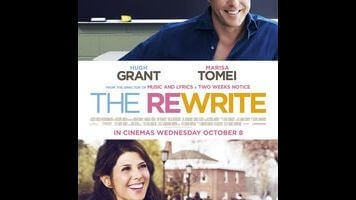The Rewrite recalls an ancient era of better Hugh Grant vehicles

The Rewrite stars Hugh Grant and Marisa Tomei in a semi-romantic comedy written and directed by Grant’s frequent collaborator Marc Lawrence, and produced by Castle Rock Entertainment. In other words, it’s poised to become one of the biggest rom-coms of 1998. But barring the invention of time travel, The Rewrite remains tethered to the realities of film releasing in 2015, which means it will get most of its play as a VOD simulation of earlier hits. It’s a reality reflected in the movie itself; back in the ’90s, a movie where Grant plays a floundering screenwriter who takes a job as a college teacher would have been set in Los Angeles, New York City, or at least a picturesque small town. Here, Keith Michaels (Grant) takes a job in western New York State at Binghamton University, a real public college where The Rewrite really was shot (and where Lawrence really did graduate), lending it a certain overcast verisimilitude. Keith even comes to love a local sandwich called the spiedie, while Tomei’s character extols the virtue of the rare sunny Binghamton day.
Authentic western New York weather and delicacies can only go so far, though; they can’t stop The Rewrite from realizing its fate as a late-period Hugh Grant vehicle. After over a decade of Lawrence-penned roles, Grant has so internalized the more caddish aspects of his persona (best used in the first Bridget Jones movie) that he and the movie both appear oblivious to the differences between the charmingly self-deprecating bumblers of his youth and, say, a middle-aged screenwriting professor who sleeps with a student during his first week on the job. Similarly, Grant and Lawrence don’t display much distinction between jokes and dialogue timed out to sound like jokes; they rely on Grant’s faux-droll asides to create the impression of humor where very little exists. The kind of clever banter Lawrence wants to write evades his grasp; the characters in the movie who are supposed to love writing dwell on a dope’s idea of what lit majors talk about—which is to say, mainly concepts from ninth-grade English. (Sample bon mot: “Nice alliteration.”)
Once in a while, Grant tosses off a funny line; more often, he’s too busy mouthing Lawrence’s patronizations. Early in the movie, Keith makes witty-sounding (which is to say, English-accented) sport of constant pitch-meeting requests for a “kickass” female character. But Lawrence stops short of parodying the hollowness of those requests, and instead settles for complaining about their supposed ubiquity. Two decades as a Hollywood screenwriter and the best satire he can muster is about the industry’s boundless and shameful appetite for strong female roles.
This regressive non-joke might have been easier to accept in a movie that showed more interest in its numerous but thinly drawn female characters. Tomei brings her usual charm to the role of Holly Carpenter, an adult student who talks her way into Keith’s class (he’s stacked the roster with as many attractive young women as possible) and good-naturedly calls him on his bullshit, but she doesn’t have enough help from the screenplay. As written, Holly is a smart, resourceful woman who nonetheless exists primarily as a potential accessory for a talented but stuck man. Keith doesn’t grow to become worthy of Holly so much as he comes to appreciate how chill she is about his initial transgressions.
In fact, for a movie that wants to be about second chances and hints of a revitalizing romance, The Rewrite nurses a consistent low-key hostility toward women, masked by its pallid sense of humor. In Keith’s intentionally female-skewed class, it’s one of two nerdy men whose talent gets singled out as exceptional; there’s also a bizarre running gag in which English department head J.K. Simmons laments his house full of daughters and a wife, before an equally hoary reversal where it turns out that—get this!—he gets teary over his love for them. Poor Allison Janney has to play Keith’s campus nemesis, a humorless prof who heads the ethics committee, loves Jane Austen, and doesn’t consider movies real art. Eventually, her cartoonish disdain starts to look sensible; this movie would rather score points against its supporting cast than actually develop a real relationship between Keith and Holly. The Rewrite has the shape of a charming romantic comedy, but Lawrence and Grant seem to assume that they’ve made one just by showing up.